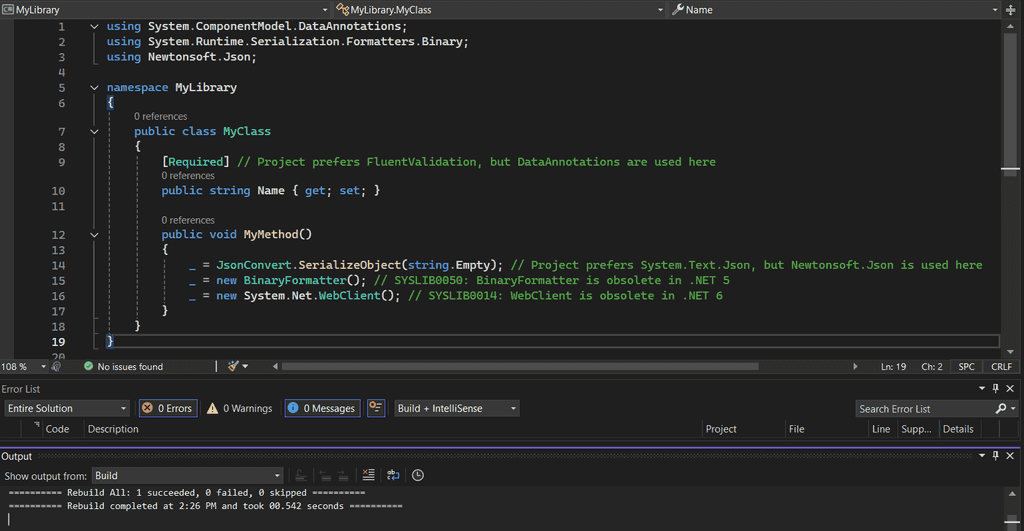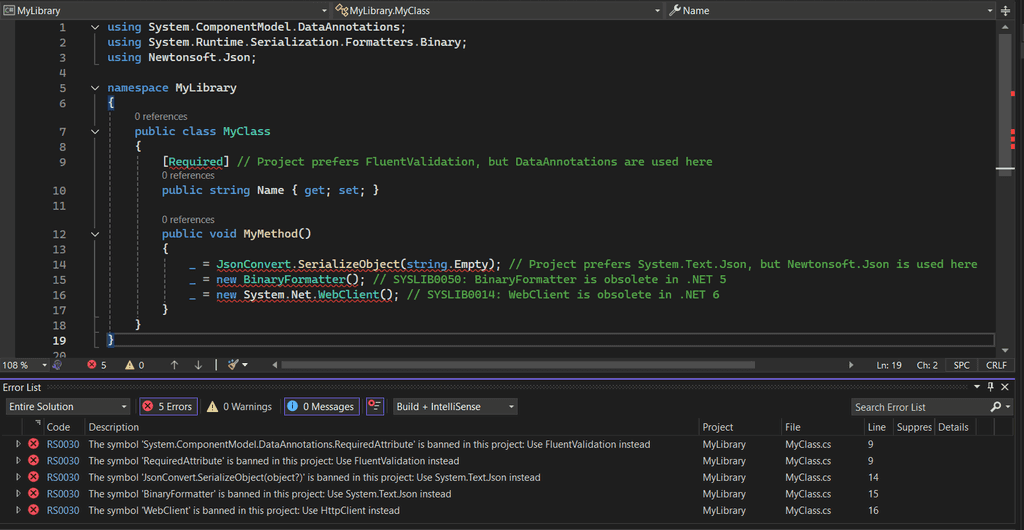Do you use BannedApiAnalyzers to prevent unwanted APIs creeping back in?
You finally dumped BinaryFormatter, replaced WebClient with HttpClient, and standardised on System.Text.Json!
But in a big codebase (or with a rotating team) someone can unknowingly add the old API back in a new feature branch, undoing days of migration work. The same risk appears with library preferences: you want everybody using FluentValidation, yet the next pull request pulls in DataAnnotations again.
Ban unwanted APIs at the compiler gate
BannedApiAnalyzers (the Microsoft-maintained NuGet package Microsoft.CodeAnalysis.BannedApiAnalyzers) lets you fail the build the instant a forbidden symbol is referenced. It’s compatible with SDK-style projects (e.g., <Project Sdk="Microsoft.NET.Sdk">), including those targeting .NET Framework.


Step 1: Install the NuGet package
dotnet add package Microsoft.CodeAnalysis.BannedApiAnalyzers
<PackageReference Include="Microsoft.CodeAnalysis.BannedApiAnalyzers" Version="3.3.4" PrivateAssets="all" />Step 2: Create BannedSymbols.txt file in the project directory
If you can name the symbol, you can ban it.
See the BannedApiAnalyzers documentation for symbol syntax details.
# Obsolete .NET APIs
T:System.Runtime.Serialization.Formatters.Binary.BinaryFormatter; Use System.Text.Json instead
T:System.Net.WebClient; Use HttpClient instead
# Non-preferred libraries
T:System.ComponentModel.DataAnnotations.RequiredAttribute; Use FluentValidation instead
M:Newtonsoft.Json.JsonConvert.SerializeObject(System.Object); Use System.Text.Json instead
M:Newtonsoft.Json.JsonConvert.SerializeObject(System.Object, Newtonsoft.Json.JsonConverter[]); Use System.Text.Json instead
M:Newtonsoft.Json.JsonConvert.SerializeObject(System.Object, Newtonsoft.Json.JsonSerializerSettings); Use System.Text.Json insteadStep 3: Add the BannedSymbols.txt to the .csproj
<ItemGroup>
<AdditionalFiles Include="BannedSymbols.txt" />
</ItemGroup>Step 4: Make it fail on build to give instant feedback to the developer
<WarningsAsErrors>RS0030</WarningsAsErrors>The analyzer emits diagnostic RS0030 (Banned Symbol), so you can elevate it to an error.
Putting it all together, your .csproj should look like this:
<Project Sdk="Microsoft.NET.Sdk">
<PropertyGroup>
<TargetFramework>net4.8</TargetFramework>
<WarningsAsErrors>RS0030</WarningsAsErrors>
</PropertyGroup>
<ItemGroup>
<AdditionalFiles Include="BannedSymbols.txt" />
</ItemGroup>
<ItemGroup>
<PackageReference Include="Microsoft.CodeAnalysis.BannedApiAnalyzers" Version="3.3.4" PrivateAssets="all" />
<PackageReference Include="Newtonsoft.Json" Version="13.0.3" />
<PackageReference Include="System.ComponentModel.Annotations" Version="5.0.0" />
</ItemGroup>
</Project>Tips for a high-impact BannedSymbols.txt
| What to do | Why it matters |
|---|---|
| Start with the “no-brain-ers.” Ban APIs already removed or obviously harmful. | Instant high signal, low friction. |
| Include a helpful hint after each symbol. | Developers know what preferred alternative to choose. |
| Refine over time. Tighten rules as the migration progresses. | Keeps the list relevant and avoids early-stage noise. |
